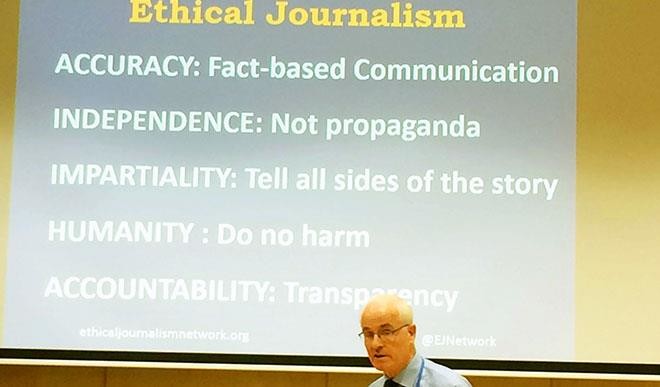
Are reporters spoon-fed? If you put the question to a group of reporters their resounding NO!! would shake the ground beneath you. This topic has not enjoyed discussion in the media public space because a) all journalists would find the idea that reporters are spoon-fed preposterous and b) no self-respecting reporter would ever consider the possibility that in his reportorial duties, he is possibly and actually spoon-fed by anyone or a group of persons.
But think again.
I do not raise this topic as a sly assault on the well-tended (think of a well-watered lawn) professional integrity of reporters. I do so because institutions grow and strengthen themselves by occasionally interrogating what everyone tends to take for granted. I anticipate some howling in the press kingdom over this discussion. The intolerant would howl their intolerance and the self-important would dismiss it right out of hand. These reactions are natural but make no dent on the fact that we may grudgingly admit. I am going to plough on and make my point in the firm belief that self-interrogation is the greatest favour a professional could do to himself. But note ye, that if I am tarred and feathered, at least you would know how my fate came about.
Does anyone dispute the fact that the main weaknesses of the press are: a) it depends on other people because other people make the news and give out the news or the information as the raw material from which the news is written and b) it is reactive?
I do not think so. The press reports what has happened,what is happening or what others decide would happen. Essentially, the press acts after the facts. This carries the obvious implication that no matter how smart or inquisitive a reporter might be he cannot feed himself with the information he needs – unless he chooses to write fiction and impugn his own integrity and that of his medium. The idea that the glamorous investigative reporter, the envy of his lesser colleagues, is a super sleuth is a myth, of course.
Media tradition has never permitted the reporter, super sleuth or not, to roam as a free agent. Believe it or not, his freedom to report the news is nowhere near absolute. He must operate by the culture and the tradition of the profession. Perhaps, this would make this point clearer. In the well-respected tradition of crime reporting, for instance, a crime reporter who witnessed an accident or a crime was not even allowed to directly tell his readers what he saw. He does not have the authority to do so. He has to confirm what he saw from the police from whom he is supposed to obtain the official and authentic information. The police might not have witnessed the accident or the commission of the crime. No matter. Authority is authority.
Much of this has changed in the last couple of decades, giving the reporter a small window to marry what he saw with the official version. Still, the police, not the reporter,is the confirming authority in matters of this nature.
Spoon feeding seems entirely negative. It suggests that the reporter is an impassive personage who, to borrow from the culinary world, sits before his source of information and laps up what comes his way. Spoon-feeding is not negative. It is, in fact, positive. It is the way the press works. And that is why when a news source misleads the reporter and feeds him with lies and half-truths, it is this garbage the reporter in turn feeds his readers (in the case of the print media) or listeners (in the case of the electronic media) with. We are all at the mercy of those who spoon feed the reporter.
Reporters cultivate news sources, right? The rationale for their existence is to lend weight to the information the reporter obtains from other sources. He does not believe the information can stand unless it is propped up and reinforced with opinions from ‘experts.’ Reporters draw the halo around these ‘experts’ to make them important and authoritative and thus lend weight to their stories. So, think of the spoon and think of the feeding. Many spoons, many feeders and many are the fed.
When the reporter seeks the opinion of a piddling lawyer, he transforms him into a top lawyer, a foremost lawyer or a legal luminary; politicians come in great colours as leading politicians, foremost politicians and foremost nationalists. Even religious leaders make the top grade as religious experts and foremost religious leaders. You cannot have an ordinary economist; he must be a leading economist. A soccer maestro is the crowned prince of soccer even if he never scored a goal in his life. And you could not have but top media executives,leading editors and the ultimate, media gurus, who speak authoritatively on matters dealing with the news media. The guru tends to make me think of the many such informed men on streets of India. Not a good feeling, I tell you.
When a reporter dresses up his piddling news source with impressive accolades, he wants his readers to place appropriate weight on his opinion. Ordinarily, the opinions of such people may not amount to much but once they have the appropriate halo over their heads, it would be foolish to dismiss them off hand. You see, the reporter spends his days being spoon feed information, views and opinions.
I am sure you are beginning to get the drift of this argument. The fact that we are spoon fed calls for care and caution in what we swallow and regurgitate. It is imperative that we get more than one view and more than one source of information in almost every given story to truly authenticate it. The reporter cannot afford not to interrogate what he is fed.
I would imagine that if a reporter seeks to know from a state governor who has not paid his civil servants for six or eight months, he would be instantly spoon fed with the stock reply of blaming it on the dwindling oil revenue. Does that tell the whole story? I am actually surprised that the press has not thought it necessary to put one such governor on the spot and go beyond the stock answer and tell the public the truth. Those who spoon feed the reporters tend to get away with murder.
However much some of us may resent the suggestion that as reporters we are actually spoon-fed, we must accept that so long as we depend on others to make and give us the news and so long as we depend on a slew of experts of all hues and colours to make our stories authentic and authoritative, so long must we accept that it is our luck as reporters and editors to be spoon fed. To see at this as an insult to crack reporters and editors is to live in professional denial.
A Billion Naira Question
When is a thief not a thief? When he has not been so pronounced by a competent court. In the arcane world of the law, only the court can decide if someone has made it up the totem pole as a thief. If you catch a man stealing your property you are free to shout Ole! Barawo!! Thief!!! But once you hand him over to the police, the man is transformed into an accused and the fact of his theft becomes an allegation. The burden of proof, called onus, is thrust upon you, the injured party. There the matter must rest until the court before which he is charged decides he is either a thief or a passer-by whose hands itched him in the presence of your property.
I have always found this rather slippery.
I am reminded of this because Daily Trust of July 2, 2016, published an engaging story with this earth-shaking headline: “Grand Theft Nationale: How elites stole Nigeria dry.” The newspaper based its story on weeks of painstaking investigation into activities of the privileged men and women who take more from the country and give little or nothing in return. I welcomed it. We had always suspected that the real thieves in our country are the elite, the men and women who bear statutory responsibilities for guarding our common wealth. We have heard it said often that the elite are the problems of our country. it is difficult to dispute it in the fact of the suppurating facts of their perfidy.
I recall this story because the newspaper published photographs of some of these elites, some of whom had been forced to return part of their loot to the government. What the paper did was to skirt around libel called innuendo: guilt or suspicion by association.
Time to fight this archaic law. Thieves must be named and their photographs published without the fear of retribution from them and their crooked lawyers supported by crooked judges.

 Join Daily Trust WhatsApp Community For Quick Access To News and Happenings Around You.
Join Daily Trust WhatsApp Community For Quick Access To News and Happenings Around You.


